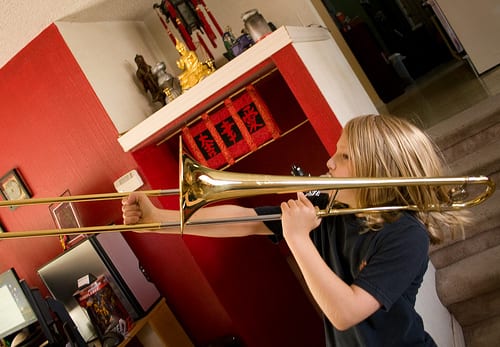 Parents are usually encouraged to take an active part in their child’s education in school, but what about in private music lessons? Read on as New Jersey music teacher Blythe Q. tackles the question…
Parents are usually encouraged to take an active part in their child’s education in school, but what about in private music lessons? Read on as New Jersey music teacher Blythe Q. tackles the question…
So, you’ve signed your child up for music lessons. She’s shown a lot of interest in playing over the past couple months and you have that lovely piano from your mother-in-law. You’re both excited to get started! But after a few lessons, she’s starting to lose interest. You heard her playing the piano pretty often at the beginning, but now she never touches it. What went wrong? She was so enthusiastic to start with and now she dreads her lessons.
I’ve seen this happen many times. A student starts off excited to learn an instrument, but her interest fades quickly when she discovers that it’s not as easy as she thought it would be. On the other hand, I’ve also seen students love their lessons more and more as time goes on. They practice all the time and are always excited to show me how far they’ve come since their last lessons.
What makes the difference? There are a number of factors that can affect a student’s enjoyment of her lessons, but the one that seems to have the greatest impact is the parents’ commitment to the student’s success. A student is more likely to enjoy her lessons if she is learning new and more challenging music all the time, as long as that music is easy enough for her to play well. That student will be able to play more interesting pieces if she practices regularly and follows the practice instructions that her teacher has written down.
That said, it is very rare for a young child or a new student to automatically go to the piano or pick up the violin to practice every day on her own. Children need to be encouraged, especially for the first few months of lessons, and that is where the parents come in. I know you are all very busy people and you don’t have unlimited time to sit with your child while she practices. However, I recommend that students under age eight practice at least 15-20 minutes a day.
This can be divided into 10-minute sessions if your child has a limited attention span. The important part is for the student’s playing to improve. Repetition is key, even though it’s not the most exciting. Over time, the student will realize that practicing all the repetitions his or her teacher has assigned means being able to play the piece better.
Not every child takes lessons because she wants to become a concert pianist or a virtuoso violinist, and that’s fine. My main goal is to foster a lifelong love of music, and this happens when my students enjoy their lessons and can see their progress from week to week. When a child sees that her parents take her music lessons seriously and are encouraging her to work hard, she’ll invest her own time and energy as well.
Most parents make sure their children have done their math and reading homework. Why not make sure your child has practiced piano as well? If you ask me, playing “Ode to Joy” is a lot more fun than multiplying fractions!
 Blythe Q. teaches piano, singing, violin, music performance, and music theory lessons to students of all ages in Lawrence Township, NJ. Blythe’s specialties include Broadway-style singing and classical/opera. She joined the TakeLessons team in September 2012. Learn more about Blythe, or visit TakeLessons to search for a music teacher near you!
Blythe Q. teaches piano, singing, violin, music performance, and music theory lessons to students of all ages in Lawrence Township, NJ. Blythe’s specialties include Broadway-style singing and classical/opera. She joined the TakeLessons team in September 2012. Learn more about Blythe, or visit TakeLessons to search for a music teacher near you!
Photo by lcrontic.com.
Suzy S.